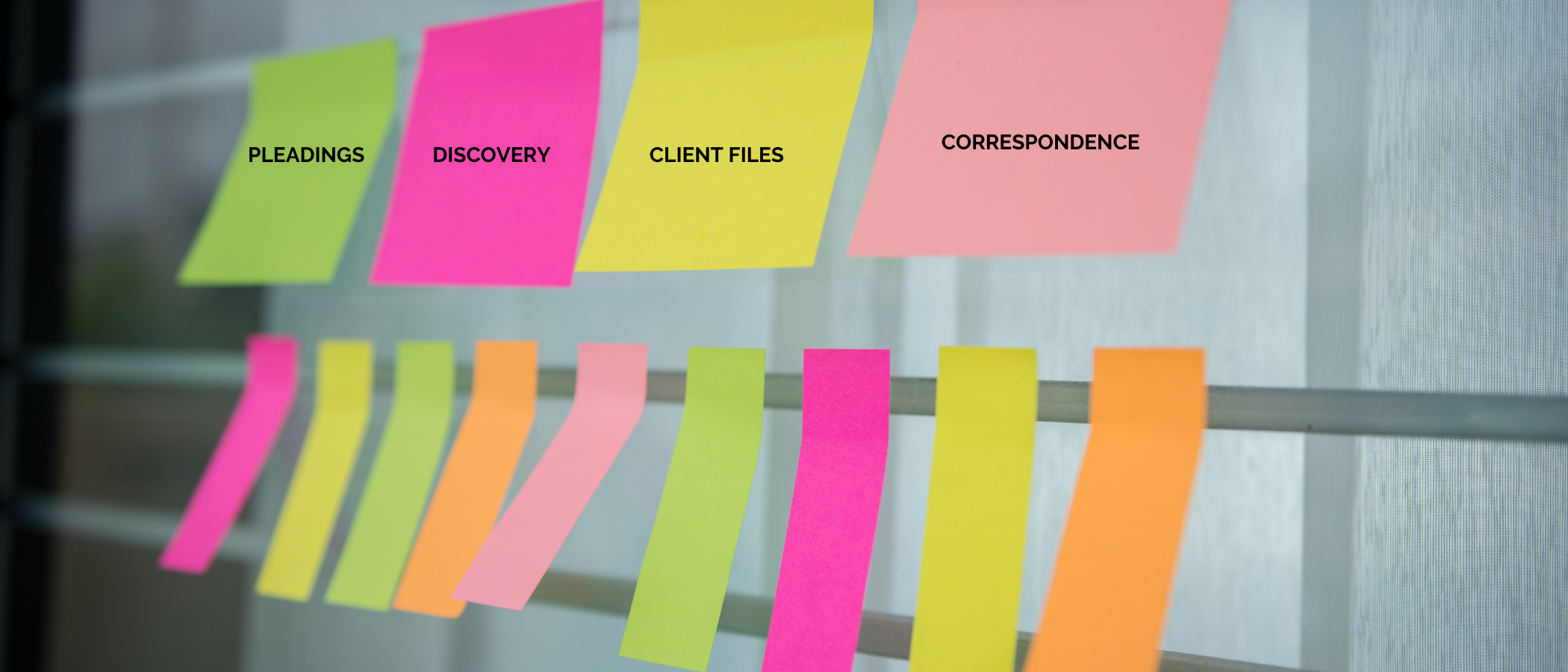Most likely, you did not have a class on case management in your paralegal certificate program. If there was, it was a chapter in one of your reading assignments and challenging to put into context until you actually put it into practice.
Unless the law firm you work for only assigns one case at a time to you (and, let’s be honest, that is not going to happen), then you are going to have to juggle more than one case and keep all of them organized.
When you’re starting a new career as a litigation paralegal, these case management tips will help you if you’re feeling a little overwhelmed.
1. Develop a case management methodology.
You might see other litigation paralegals doing things that seem a little OCD: like a color-coding system for file folders, triple-checking the number of exhibits, or color flagging emails by case or priority. These are all methodologies they’ve developed over the years to reduce the time it takes to find things in their cases and help keep them organized.
Being OCD about your methodology is also a way to know when something is wrong early on in a project. For example, suppose you have a methodology in which you always put your initials in the upper right corner of pleadings that you’ve seen and calendared the deadlines. In that case, you’ll immediately know something got missed when you see a pleading without those initials on the pleading. But this methodology only works if you are very consistent with it so that you won’t be second-guessing why there is not an initial or a flag on something.
Tip for new litigation paralegals: Ask one of the more experienced litigation paralegals in your office how they organize their files and why they use that particular methodology. Even if the same system doesn’t work for your specific practice area, you can use it as a foundation to set up a customized version of that organization system.

2. Don’t be afraid to change things up!
You take a new position as a litigation paralegal, and you are trying to get a grasp on what is going on in each of your cases. You struggle to find things. The attorney struggles to find things. But you’re afraid to “make waves” or change how things are organized. Don’t be!
This rings particularly true when you are the only paralegal in the office, and it was a former paralegal or an attorney who set up the file organization system. If you are the person responsible for finding things, you will want to make sure it’s a system that works for you.
You need to know what your organizational system is before you actually try to start organizing anything. Why bother? Because how well your cases are organized is going to determine how much time you spend trying to find things later in the case.
Setting up a system that ensures that the same types of information are placed in the same areas so that the cases themselves are filed in the same way makes it very easy to find information, even if you have not visited that case file recently. If you don’t know where to get started with an organization system, look into some available project management tools to get inspiration. Knowing some basic project management principles is helpful to any paralegal career, but even more so for a litigation paralegal.
3. Prioritize Your Cases.
To prioritize your cases, it will require you to know what is happening in ALL of your cases at ALL times. Paralegal case management can only be successful with an open line of communication with the lawyer or lawyers that you work for to develop a system where you’re automatically notified of upcoming deadlines and new pleadings that have been filed.
Do you know which cases are the most important? Why are they the most important?
Do you know which cases have deadlines coming up this month?
Those cases are the ones that you need to be giving the most attention to right now. To know those two things, you will have to be familiar with the docket and either read your lawyer’s mind or make sure that you ask them which cases they believe to be the highest priority.
Once you have prioritized your cases, you should prioritize your workday so that the most important and urgent projects get done first. I wrote more about time management and prioritizing workdays here.
One way to prioritize your cases is to create a Projects List. A project has more than one task that has to be completed to check it off as completed. For example, does your to-do list look like this for tomorrow:
1. ABC v. DEF Interrogatories
2. Depo prep Smith case
3. Trial Exhibit List – Dorsey

The problem with that to-do list is that you’re not going to know when to check off those items from your to-do list because there are many smaller tasks associated with each one of those items.
Instead, think of those things like projects that require more than one action to complete. With that mindset, you know that you’re never going to be able to check those items off your list until the entire project is done. Instead, break up that “projects list” into all of the discreet tasks that it will take to complete the project.
For example:
ABC v. DEF Case
1. Call ABC client for draft interrogatory responses to #’s 2, 3, 4
2. Review client documents to get the answers to other interrogatory questions
3. Draft standard objections section of interrogatory responses
4. Draft interrogatory responses
5. Send draft interrogatory responses for attorney’s review
Smith Case
1. Review production files for Sam’s depo in Smith Case
2. Review other depo transcripts for mention of Sam in other’s testimony
Dorsey Case – Getting Ready for Trial
1. Run a report in the production database for key docs to include in the trial exhibit list.
2. Run deposition exhibit report to include as exhibits in the trial exhibit list.
This method of preparing a task list “by the project” will allow you to check more items off your to-do list and know when each project is closer to being completed. Bonus – It also makes it mentally rewarding to see more of those checkmarks at the end of each day!
Want more paralegal case management skills?
Join us in the Litigation Paralegal Boot Camp and your attorney will think that you can read their mind!
Litigation Paralegal Boot Camp
Are you tired of being the Panic Mode Paralegal who spends your days playing whack-a-mole with last-minute rush projects because you’re waiting for someone to show you what it takes to be great litigation paralegal?
This is the only program of its kind that provides litigation paralegals with all of the tools to master litigation cases from the complaint through the trial, and everything in between.
You will be the Confident Case Strategist faster than you ever imagined possible.

Meet the Author

Ann Pearson is the Founder of the Paralegal Boot Camp and host of the Paralegal Coach Podcast Show. Ann is passionate about promoting the paralegal profession.
Ann spent 20 years working as a paralegal manager and a litigation paralegal before opening the Paralegal Boot Camp in 2010.
Ann’s training programs focus on adding immediate value to a paralegal’s career and bridging the gap between what a paralegal learns in school and what they actually do on the job.
Visit the About Us Page to learn more about why Ann started the Paralegal Boot Camp.















